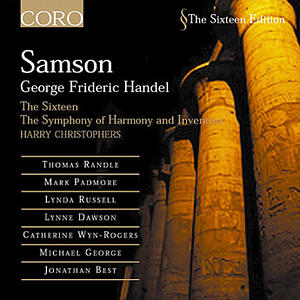Arguably
Handel’s finest creation, Samson is here recorded ‘complete’. We are
given a hitherto unheard choral 4-bar sequel to “Let the bright Seraphim” and
Micah’s strange ‘cantata’ beginning “Then long Eternity”, and also his “It is
not Virtue” with its jarring misogyny. It is good to be able to judge these
items for one’s self, rather than know them from the score alone. Milton’s
grim closet drama, Samson Agonistes, along with others of the poet’s
major works, was prized for its Christianisation of classical epic
(eighteenth-century protagonists overlooked his fierce republicanism).
Newburgh Hamilton, Handel’s librettist, produced a thoroughly viable drama
from Milton’s materials, one that became better known in the later eighteenth
century than the original. His interpolation of excerpts from other poems by
Milton enriched the overall effect: whereas Milton ended with the consolatory
phrase “calm of Mind all Passion spent” Hamilton closed the drama with a
gloriously redemptive “blaze of Light”. A good performance must convey the
emotional exhaustion of anguish and reproach, the giddy preoccupation of
heathens, and affirm the ardent hope offered by Christianity.
The overture’s mood of Philistine sensualism is splendidly captured. Samson
presents the performers and listeners with many opportunities to contrast the
brash panache of Philistine shouts of joy and heathen dancing (and what relish
Christophers brings to this music!) with the melancholy brooding of Samson and
Micah’s patient coaxing of the imprisoned hero out of his obsessive bouts of
self-pity. Unhappily in Part 1 of this Samson, which is perhaps its
greatest flaw, the Israelite music could have done with more bite. For
instance, a theorbo continuo softens Samson’s despair, which Randle renders
polite rather than embittered. While the words and music make Samson complain
about himself, his friends, even God, Tom Randle, though singing well enough
in the first Part, does not protest vehemently enough. “Total Eclipse” is
played and sung in a manner suggesting a gentler psychology than Hamilton and
Handel intended. The Sixteen, however, excels in “O first created Beam” with
an understated intensity, each line of entry clearly delineated - a feature of
all their numbers. In the otherwise anonymous role of Israelite man, Mark
Padmore’s strong personality bursts through when singing of reputation as a
bubble in “God of our Fathers”. Michael George’s Manoa has a dignity which
confirms that Randle’s Samson comes from heroic stock.
In Part 2 things perk up. The finely-caught wily insinuations of Lynda
Russell’s Dalila spurs Randle into a belatedly venomous performance of his
recitatives (e.g. “Ne’er think of that”); the latter’s rueful regrets as he
accepts responsibility for the cause of his humiliation at her hands charges
“Your Charms to Ruin” with a noble authority. Their duet “Traitor to Love” is
a suitably fiery example of the lack of domestic bliss that once existed
between them. It is a pity that the Virgins and Dalila were not separated
stereophonically; on this recording the Virgins merely echo when they should
help to confuse the blind hero over who is petitioning him. The interchange in
recitative, air, and duet, between Jonathan Best as the braggart Harapha and a
newly-defiant Randle glows with excitement, and is perhaps the highlight of
the recording: “baffled Coward” is spat out. The Sixteen gives a lucid clarity
to the piety of “Hear us, O God” with its old-fashioned polyphony (borrowed
from the lament from the conclusion of Carissimi’s Jephte). Bernard
Shaw claimed that the chorus “Fix’d in his everlasting Seat” should “strike
the atheist dumb”, but here it is too tamely performed for that - perhaps
Christophers’s band is insufficient in numbers to provide Handel’s stylishly
assertive music with appropriate power.
Part 3 goes well throughout. The great lament is consummately done, the whole
performance coming together with considerable grandeur. Lynne Dawson’s
unaccompanied solos, “The Virgins too” and “May ev’ry Hero”, are admirably
articulated. Padmore’s Philistine man is splendidly vacuous, while George’s
“How willing my paternal Love” is a gem of heartfelt sensibility.
Singers’ cadences are thankfully brief, and it is a relief to hear all airs
end on the note that Handel specified. Decoration is generally judicious
because it is sparing, though Dawson goes astray in “Let the bright Seraphim”.
All tempi are nicely judged, and there are no glutinous rallentandos. A first
rank performance of Samson observes the incremental tension that Handel
and Hamilton wrote into the great scenas across all three Parts. Christophers
takes a traditional oratorio approach, carefully pausing between most
movements, enough to prevent the essential sense of rising drama in Parts 1
and 2. But this recording is unlikely to be surpassed easily, and is most
warmly recommended.


